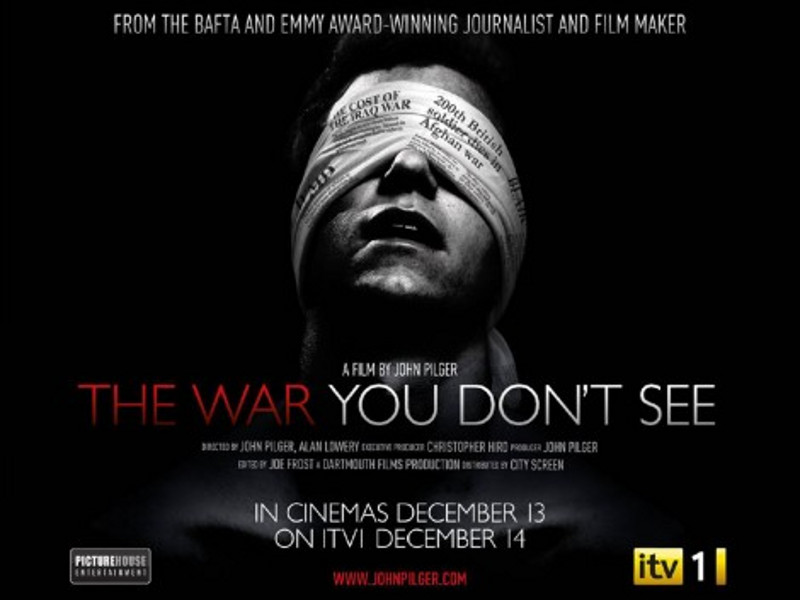The Wars You Don’t See – about how the media is hiding the truth, by John Pilger
From Wikipedia
 The War You Don't See is a 2010 British documentary film written, produced and directed by John Pilger with Alan Lowery, which challenges the media for the role they played in the Iraq, Afghanistan, and Israel/Palestine conflicts.
The War You Don't See is a 2010 British documentary film written, produced and directed by John Pilger with Alan Lowery, which challenges the media for the role they played in the Iraq, Afghanistan, and Israel/Palestine conflicts.
The film begins with footage of an unreported July 12, 2007 Baghdad airstrike and black and white stills of the victims of the U.S. Occupation of Iraq. In his opening narration Pilger quotes World War I British Prime Minister David Lloyd George’s comment to Guardian editor C. P. Scott that, “If the people really knew the truth, the war would be stopped tomorrow.” He goes on to state that this film will draw on his own experience as a war correspondent to question the role of the media in conflicts such as Iraq and Afghanistan.
Media historian Professor Stuart Ewen demonstrates how Edward Bernays’s use of fear to win US public support for the First World War set a precedent used in the build up to the 2003 Invasion of Iraq. Former CIA analyst Professor Melvin Goodman states that part of the Pentagon’s almost 1 billion annual propaganda budget is used to manipulate the news. US Assist. Secretary of Defence Bryan Whitman states that most western media reports came from the 700 embedded reporters. Former CBS news anchor Dan Rather, former BBC world affairs reporter Rageh Omaar and former Observer journalist David Rose admit to not having done their jobs properly within this regard.
Independent journalist Dahr Jamail, supported by un-broadcast footage from independent filmmaker Mark Manning, reveals the massive unreported suffering of civilians. FAIR’s Steve Rendall relates the story of AP journalist Charles Hanley, whose January 2003 report debunking WMD sites in Iraq went unpublished, as an example of how independent journalism could have averted the war. Pilger confronts BBC Head of Newsgathering Fran Unsworth and ITV News Editor in Chief David Manion for their uncritical echoing of officials.
Public Interest Lawyers’ Phil Shiner details the unreported use of torture on Iraqi civilians such as the murdered Baha Mousa. Photographer Guy Smallman narrates the Granai airstrike which was played-down by the mainstream media in accordance with Edward S. Herman’s theory on unworthy victims. Pilger reports from the Armed Forces Memorial to show the extent of Britain’s unreported enduring imperial role in post-WWII peacetime, confirmed by historian Mark Curtis who believes that journalists could have prevented the war.
Former British Foreign Office diplomat Carne Ross testifies to the unreported suffering inflicted on Iraqi civilians by the post-Gulf War economic sanctions and bombing, which went unquestioned by journalists reliant on official information channels. Glasgow University Media Group’s Professor Greg Philo analyses the intimidation of journalists reporting of the Israeli military occupation of Palestine. Pilger confronts Unsworth and Manion over the Israeli propaganda which dominated BBC and ITV coverage of the Gaza flotilla raid.




